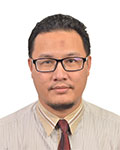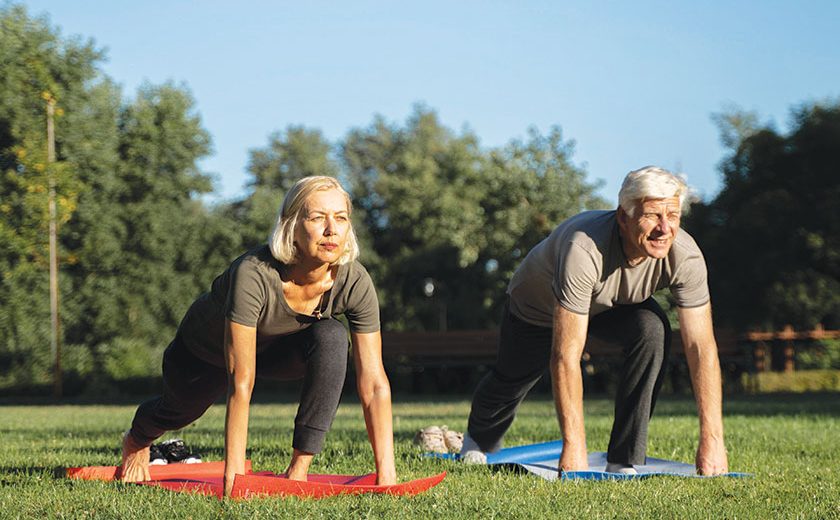What makes a healthy nation that lives well and ages well? Is it their overal lifestyle? The food they eat? A certain social standing?
And, how does modern medicine play a part in adding years to one’s life? Natural Health talked to an expert this month, namely Dr Ungku Ahmad Ameen Ungku Mohd Zam, Consultant Geriatrician, Sri Kota Specialist Medical Centre, to see what he has to say.
NH: Noncommunicable diseases happen to be the main health risk for older people. Hence, how can our local health authorities help in addressing this issue?
Dr Ungku Ahmad: In 2010, the population of people aged 65 and above was estimated at 524 million, with that number growing to 1.5 billion by the year 2050. The advancements in modern medicine have led to the increasing longevity of the world’s population, showing how that age group is able to triple in size just in 40 years.

However as people grow older, their body’s internal system becomes weaker, making them more vulnerable to Non-Communicable Diseases (NCD). Alzheimer’s, Chronic Obstructive Pulmonary Disease, Parkinson’s, Nephritis, Leukemia, and various Cancers are some examples of common NCDs experienced by the aged population. Causes of NCDs have been linked to behavioural factors such as sedentary lifestyles, dietary patterns, use of tobacco, alcohol, and lack of physical activities.
The Malaysian Government has implemented programmes to reduce NCDs in the form of preventive healthcare services and the promotion of healthy lifestyles. An example of this is the ‘National Strategic Plan for Cancer Control Program’, which aims to reduce the morbidity and mortality of cancer. The programme calls for the support and collaboration between public and private sector, professional bodies and NGOs to address cancer burdens and management issues in the country. Another example of our Government’s efforts is the ‘Salt Reduction Strategy to Prevent and Control NCD For Malaysia’ which aims to educate Malaysians on the harmfulness of too much salt with the goal of reducing the average salt intake from 8.7 grams/day to 6.0 grams/day. These examples are all part of the Ministry of Health’s National Strategic Plan for Non-Communicable Disease, which was launched back in 2016 in efforts to improve the quality of life of all Malaysians.
NH: What are some of the effective (and cost-effective) measures that hospitals, clinics and even old folks medical centres can take now to make a difference?
Dr Ungku Ahmad: Poor understanding of the ageing process, complexity of medical conditions in the elderly, and lack of social support result in recurrent admissions to the hospital. Hospitalisations among the elderly are associated with prolonged hospital stays, iatrogenesis, immobility and its associated complications. Other examples such as aspiration and orthostatic pneumonia, hospital acquired infection, acute confusional state, pressure injury, adverse drug reactions have resulted in increased cost of care for elderly patients.
The strategy to prevent all these complications from happening is by understanding that the elderly are a heterogenous group of people. Age alone does not define how healthy or frail the older person is. Therefore, treatment given to the patients need to address:
- Aim of management – to achieve certain targets without compromising the patient’s quality of life. For example, to aim for a Hemoglobin A1c (HbA1c) level of 6.5% in a frail 80 year old is unrealistic, as this can predispose the patient to hypoglycemia that may result in other complications
- Addressing not just the medical condition, but also assessing and addressing the patient’s psychosocial problems that will affect the patient’s well being
- Assessment of patient’s physical and cognitive functions that are vital in maintaining their independence
Healthcare providers for the elderly must first be well equipped with a fundamental understanding of how unique ageing processes affect the elderly, as their needs are typically very individualised. When dealing with an elderly person, assumptions are not to be made without having clear facts of the issues faced.
NH: How does a healthy lifestyle help, and what constitutes as a generally healthy lifestyle for all those aged 50 and above?
Dr Ungku Ahmad: Rather than a ‘healthy lifestyle’, we should focus on ‘healthy ageing’. The World Health Organisation defines healthy ageing as the process of developing and maintaining the functional ability that enables our wellbeing in older age. Functional ability is about having the capabilities that enable people to be and do what they have reason to value. Some examples are the person’s ability to meet their basic needs, learn, grow and make decisions; be mobile; build and maintain relationships; and contribute to society.
For someone to age well, they should exercise and participate in some sort of physical activity on a regular basis. Taking a leisurely walk around the park is a form of exercise and is highly recommended to those unable to partake in more strenuous activities. Eating healthy and in moderation is also important for healthy ageing, it can be as easy as reducing salt and sugar intake in your everyday meal. When shopping for groceries, keep an eye out for foods low in saturated fats, trans fats, cholesterol, salt (sodium), and added sugars.
Finally, keeping your mind active as you grow older is another key factor for healthy ageing. Staying at home for prolonged periods of times can be unhealthy, and unfortunately the COVID-19 pandemic caused many to be stuck at home. The elderly should look into technology to help them stay connected with their friends and family.
Those who keep their body and mind active as they grow older are:
i. Less likely to develop NCDs – Participating in hobbies, social and leisure pursuits may lower the risk of developing some health problems.
ii. More likely to live longer – a study showed that older adults who took part in social activities (such as playing games, belonging to social groups, or traveling) or productive
iii. Activities (such as having a paid or unpaid job, or gardening) lived longer than people who did not.
iv. Happy and less depressed – another study suggests that older adults who engage in meaningful activities, like volunteering, say they feel happier, which can lead to a healthier life.

NH: There is a long-standing stigma concerning ageing, and that is it’s inevitable and that health issues that are supposed to come along with it cannot be avoided. How can we as a community break that mindset and help the ageing enjoy a better quality of life?
Dr Ungku Ahmad: The causes of NCDs do not solely depend on a person’s age. Although it is more likely to occur as a person gets older, it is largely due to the lifestyle they had when they were younger. Typically, NCDs start to occur at ages 40 and above, but recent data shows that adults in their late 30s can start to develop symptoms for such diseases without realising it. As such, it is important to lead a healthy lifestyle from a young age as this will tremendously reduce the risk of getting chronic diseases that will impair the physical, psychological as well as cognitive functions later in life.
The stigma surrounding age and the inevitability of health issues can be changed by sharing stories of the elderly who have successfully aged without health issues. There are many who lived past 90 years and were able to remain in the pink of health because of the lifestyle they had. This is why it is vital to start educating our society from a young age on the importance of health. The above points about eating healthy, staying physically and mentally active should begin from a young age as prevention is always better than cure.
Ageing is not a disease, but it is a process that will affect everyone. It is important as a community to understand that as a person ages, they should not be shunned from society but supported. Old folks should be allowed to continue working if they desire to as long as the work is not physically demanding on their bodies, as the mental stimulation from work can help prolong their lives.
NH: What kind of steps can older folk in general, or those getting there, take to improve the way they age?
Dr Ungku Ahmad: Ageing does not mean you have to be socially withdrawn and become sedentary. Nutritious food, regular exercise and an active mind will take the ageing process to greater levels than one can imagine. It is never too late to start a healthy lifestyle, always remember that starting today will be better than starting tomorrow. It is also key to have a positive mindset and surround yourself with good company and loved ones who will motivate you to become your healthiest self.
NH: What are your thoughts on the Covid-19 vaccine and the elderly? Please feel free to elaborate.
Dr Ungku Ahmad: Data has shown that people of older ages who have existing chronic conditions are most likely to be associated with undesirable outcomes when infected with COVID-19. Because of this, many of the elderly refuse to visit clinics and avoid seeking care in hospitals or emergency departments due to fear of contracting the virus, but this has led to higher morbidity and mortality due to their inability to receive proper treatment for their NCDs or general health. On top of that, there have been news about COVID-19 related deaths in nursing homes around Malaysia. As of this moment, vaccinations are the only strategy to prevent the elderly from contracting the virus. Studies have shown that the COVID-19 vaccines are safe and effective, as they yield the immune response desired. It is crucial that the elderly population receive their vaccines once the second phase of our country’s vaccination programme begins. But before then, we have to play our part by practicing social distancing for the betterment of our country and elderly.
 Q & A with Dr Ungku Ahmad Ameen Ungku Mohd Zam
Q & A with Dr Ungku Ahmad Ameen Ungku Mohd Zam
Consultant Geriatrician, Sri Kota Specialist Medical Centre


